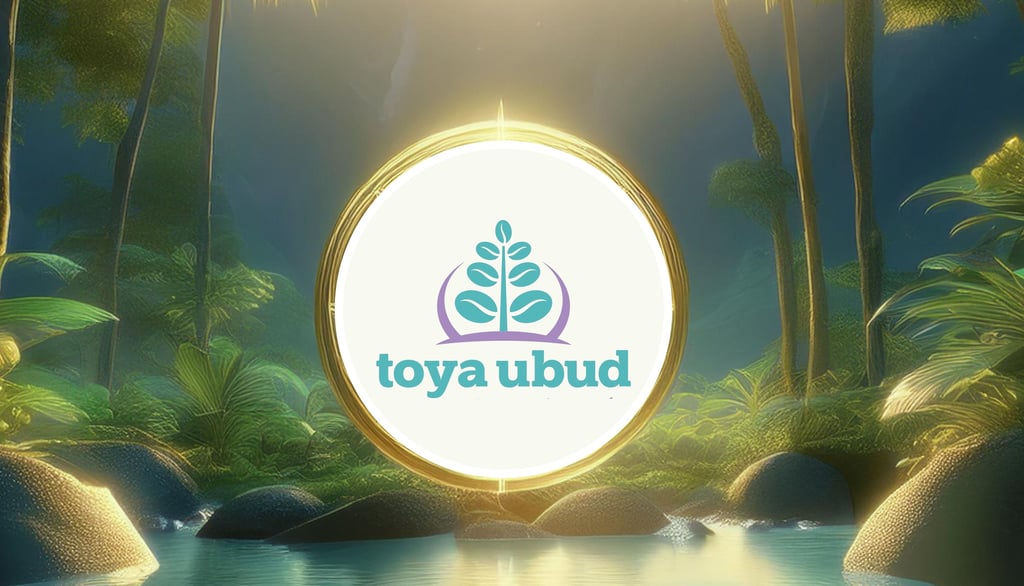Toya Ubud: A Journey Through Nature, Culture and Healing
Inspiration


In the heart of Bali, Toya Ubud emerges as a sanctuary that beautifully embodies a harmonious blend of nature, healing, and tradition. At its core, Toya Ubud isn’t just a physical space—it is a philosophy, a story told through its design, its practices, and even its logo, which weaves together layers of symbolic meaning. This story is deeply rooted in Bali’s rich cultural tapestry, interwoven with elements of spiritual healing, natural beauty, and sustainable living. The visual identity of Toya Ubud reflects these values, presenting a narrative that resonates not only with the land but also with those who visit, seeking tranquility, balance, and renewal.
The name Toya itself is a powerful nod to one of nature’s most vital elements—water. In Balinese, toya translates to “water,” and in the context of Toya Ubud, water takes on a special significance as a symbol of healing and rejuvenation. Ubud, known for its deep association with medicine and wellness, amplifies this meaning. Together, Toya Ubud evokes an image of healing waters, a natural oasis where people come to cleanse not only their bodies but also their spirits.
One of the most sacred sources of water in this philosophy is the Manuaba waterfall, a mystical place where seven rivers converge into holy springs. This confluence of rivers creates a powerful metaphor: just as these waters merge into one sacred flow, so too do the diverse elements of nature, tradition, and healing unite in perfect harmony at Toya Ubud. The logo reflects this profound connection with water, inviting visitors to immerse themselves in the essence of purification and spiritual renewal.
Every detail of Toya Ubud’s logo is thoughtfully designed to tell a story. The turquoise green leaves, for instance, are more than just a visual nod to the park’s lush surroundings. Their shape, reminiscent of coffee beans, represents the park’s vibrant natural environment and its commitment to conservation. These leaves also symbolize growth and fertility, reflecting the bountiful life that thrives in the ecosystem surrounding Toya Ubud.
The reference to coffee beans is not accidental. Toya Ubud is closely linked to a nearby coffee plantation that plays an essential role in the local environment. This plantation contributes to reforestation efforts, a vital aspect of sustainable living in Bali. The act of growing and nurturing coffee is more than just an agricultural practice—it is a testament to the region’s dedication to sustainability and the preservation of its natural heritage. Through its logo, Toya Ubud highlights its role in fostering a deep respect for nature while simultaneously supporting local traditions and economies.
The Spiritual Connection: Elephant Tusk and Temple Gates
Beyond nature, Toya Ubud’s identity is also deeply intertwined with spirituality and tradition. The purple line in the logo is a subtle but powerful symbol. It represents the entrance to a Balinese temple, with its iconic split gates that lead worshippers into a sacred space. The gates are a reminder of the spiritual journey that every visitor embarks upon when they step into the park. More than just a place to explore, Toya Ubud is a place to connect with something greater—a higher sense of purpose, peace, and well-being.
But the spiritual connection doesn’t end there. The curve of the purple line also evokes the majestic sweep of elephant tusks, which in Balinese culture symbolize strength, wisdom, and protection. Elephants, revered as sacred animals, are often associated with Hindu deities like Ganesha, who embodies wisdom and the removal of obstacles. This allusion to Ganesha and his elephant-like features in the logo emphasizes Toya Ubud’s role as a protector of nature, culture, and well-being. It reminds visitors that this sanctuary is a place where they can find strength and guidance as they navigate their personal journeys.
Toya Ubud is not just a retreat into nature; it is a bridge to Bali’s sacred traditions. The purple line in the logo not only represents temple gates but also symbolizes the park’s connection to the sacred Griya Sakti Manuaba Temple and Toya Devasya. These revered sites are central to the spiritual landscape of the region, and Toya Ubud draws upon their energy and blessings.
The Griya Sakti Manuaba Temple is known as a place of healing and spiritual power. Many come to the temple to seek blessings, protection, and spiritual guidance. Toya Devasya, with its hot springs and healing waters, similarly attracts those looking for physical and spiritual renewal. By aligning itself with these sacred spaces, Toya Ubud reinforces its identity as a place of transformation, where visitors can reconnect with themselves, the land, and the divine.
Sustainability at the Core: A Commitment to Conservation
Toya Ubud’s philosophy is not just about creating a beautiful and serene space—it is also about sustaining that space for generations to come. The commitment to environmental conservation is at the heart of everything the park does, from its reforestation efforts to its support of local agriculture. The use of natural elements in the logo, like the green leaves and coffee beans, is a visual reminder of this ongoing dedication to preserving the environment.
In many ways, Toya Ubud serves as a model for how humans can live in harmony with nature. By carefully cultivating the land and practicing sustainability, the park creates a balance that benefits both the local community and the natural world. Visitors are invited not only to enjoy the beauty of the park but also to take part in its mission of environmental stewardship.
Ultimately, the logo of Toya Ubud is much more than a visual representation—it is a story, one that encapsulates the park’s essence: a seamless blend of nature, culture, and sustainability. Each element, from the water symbolism to the coffee beans and elephant tusks, weaves together to create a narrative that invites visitors to embark on their own journey of healing and discovery.
At Toya Ubud, nature is not just a backdrop—it is a living, breathing part of the experience. Culture is not just an idea—it is woven into the very fabric of the place. And sustainability is not just a goal—it is a practice, one that shapes every aspect of life at the park. For those who visit, Toya Ubud offers more than just a retreat—it offers a philosophy of living, one where nature, tradition, and modern life can coexist in perfect harmony.
Jl Raya Kenderan Tegalalang, Gianyar - Bali
123-123-1234
hello@toyaubud.com


